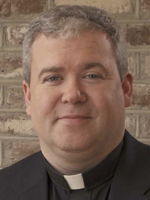Editor’s note: This is part of a series for Lent.
Poverty. Ignorance. Racism. Violence. Each of these words has a power and a reality that is harsh and calls out for conversion and help. Each of them can seem daunting. In the face of such difficulties, what are we to do as Christian believers?
In the midst of many possible answers, we see the life of St. Katharine Drexel.
St. Katharine was born in 1858 to wealthy parents who were of deep faith and generosity. After the death of her mother early in her life, her father remarried. Her stepmother was very influential over St. Katharine, and taught her the importance of compassion and kindness.
Growing up Catholic, St. Katharine slowly realized the central place of prayer in her efforts to be a good Christian.
In her reading and travels, St. Katharine came to see and understand the plight of so many people, especially those with no voice or advocate. She sought to be a peacemaker and help people in their struggles. She worked to change racist views and ignorance with love and education.
After nursing her beloved stepmother through a three-year terminal illness, St. Katharine understood more deeply the place of earthly goods and of Christian charity. She desired to give more in her life.
Pope Leo XIII challenged her to be a missionary, and she accepted the call. Upon the death of her father, she donated her entire inheritance to the care and help of those in poverty and need. The inheritance was approximately $20 million, which today would measure in excess of $200 million.
In addition, she founded the Sisters of the Blessed Sacrament in 1891, and stressed the importance of prayer and the holy Eucharist in the efforts to serve and assist those in need.
The saint traveled extensively, including to South Carolina, and labored with love to change views and to empower those in need.
By 1942, she saw the establishment of 40 mission centers, 23 rural schools, 50 Native American centers, and the creation of Xavier University in New Orleans, which was the first university for African-Americans in the United States.
The Lord Jesus tells us: “Blessed are the peacemakers, for they shall be called sons of God” (Mt 5:9). St. Katharine understood this teaching. She believed in the dignity of each human person, and saw all people as children of God. She lovingly sought to be an instrument of peace: to combat racism, enlighten ignorance, expose violence and heal poverty.
She frequently told the sisters, “We must attract with joy.”
St. Katharine had this confidence because she lived a prayerful life and was completely dependent on God’s providence. She knew it was his peace that she sought to give all people.
At age 77, St. Katharine suffered a serious heart attack. For almost 20 years afterward, her health forced her to live a quiet life of prayer and counsel. She would not surrender to self-pity or envy, but encouraged and strengthened the sisters to continue the work of the Lord.
In 1955, at the age of 96, St. Katharine passed from this life to the next. She claimed and constantly lived her inheritance as a child of God. She served God’s neglected children and worked for peace.
St. Katharine Drexel is an example to us and an answer for how we are to live as Christian disciples.
Father Jeffrey Kirby is a priest of the Diocese of Charleston currently studying moral theology in Rome.

